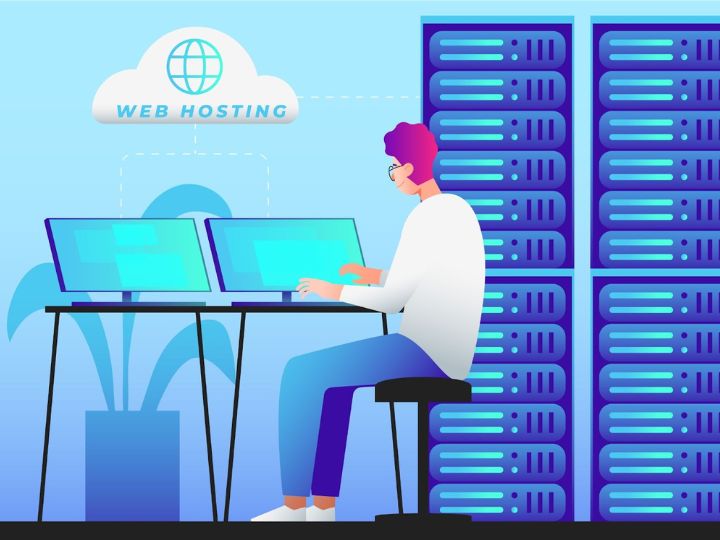Differences Between VPS Hosting and Cloud Hosting: Exploring Two Leading Hosting Options

When it comes to selecting the perfect hosting solution for your website or application, two popular contenders that often come into play are VPS hosting and cloud hosting. While both options offer reliable and scalable hosting environments, there are fundamental differences that make each better suited for distinct scenarios. This article delves into the comparison between VPS hosting and cloud hosting, shedding light on their unique attributes and guiding you in choosing the best approach based on your specific requirements.
VPS Hosting: The Power of Virtualization
VPS, also known as Virtual Private Server, hosting involves dividing a physical server into multiple virtual servers, each functioning independently with dedicated resources. Here are key aspects of VPS hosting:
Performance: VPS hosting guarantees excellent performance by allocating dedicated resources, including CPU, RAM, and storage, to each virtual server. This ensures efficient handling of high traffic volumes and resource-intensive tasks for your website or application.
Scalability: While VPS hosting allows resource upgrades, it does have certain limitations in terms of scalability. Scaling usually entails adding more resources to your existing virtual server or migrating to a higher-tier plan.
Control: VPS hosting empowers you with greater control over your server environment. With root access, you can install custom software and configure server settings according to your precise requirements.
Cost: VPS hosting generally proves to be more cost-effective compared to cloud hosting. Since you are allocated specific resources, you pay only for what you use, making it a favorable choice for budget-conscious individuals or businesses.
Cloud Hosting: The Flexibility of the Cloud
Cloud hosting harnesses a network of virtual servers collaborating to provide hosting resources. Here’s what you need to know about cloud hosting:
Scalability: The standout feature of cloud hosting lies in its exceptional scalability. You can effortlessly scale your resources up or down on-demand, adding or removing virtual servers as your needs fluctuate. This ensures your website or application can handle sudden spikes in traffic seamlessly.
Reliability: Cloud hosting is renowned for its high reliability. If one server in the network encounters an issue, your website or application automatically shifts to another server, ensuring minimal downtime and uninterrupted service.
Pay-as-You-Go: With cloud hosting, you pay for what you use. This flexible pricing model allows you to scale resources as required and avoid overpaying for unused capacity.
Shared Resources: Cloud hosting operates on shared resources among multiple users. While this facilitates cost savings and efficient resource utilization, it also means performance can be influenced by the activities of other users on the same network.
Choosing the Right Approach
Now that we’ve examined the fundamental differences between VPS hosting and cloud hosting, let’s explore which approach might be better suited for specific situations:
Small to Medium-Sized Websites: VPS hosting is often a suitable choice for small to medium-sized websites requiring dedicated resources and greater control over the server environment.
High-Traffic Websites or Applications: Cloud hosting proves ideal for high-traffic websites or applications that encounter frequent traffic spikes. Its scalability and reliability guarantee optimal performance during peak periods.
Budget-Conscious Individuals or Businesses: VPS hosting’s cost-effectiveness makes it an attractive option for those on a tight budget, allowing them to benefit from dedicated resources without straining finances.
Rapidly Growing Businesses: Cloud hosting provides the flexibility to rapidly scale resources as your business grows, accommodating increased demand without manual resource upgrades.
Understanding the distinctions and evaluating your specific needs will enable you to make an informed decision. Whether you prioritize dedicated resources and control (VPS hosting) or scalability and flexibility (cloud hosting), rest assured there’s a hosting solution tailored to meet your requirements.
Why Choose BlueVPS?
When it comes to selecting a reliable hosting provider for either VPS or cloud hosting, BlueVPS stands as an excellent choice. Here’s why you should consider BlueVPS:
Trusted Provider: BlueVPS boasts a solid reputation for delivering top-notch hosting services with exceptional performance, reliability, and security.
Customized Solutions: BlueVPS tailors hosting solutions to meet your specific requirements, regardless of whether you choose VPS or cloud hosting. They recognize that each business has unique needs and provide personalized support.
Cutting-Edge Infrastructure: BlueVPS leverages state-of-the-art hardware and advanced networking infrastructure to ensure optimal performance and stability for your websites or applications.
Scalability and Flexibility: With BlueVPS, scaling your hosting resources as your needs evolve is effortless. Whether you opt for VPS or cloud hosting, they offer seamless upgrade options to accommodate your growing demands.
Expert Support: BlueVPS employs a team of knowledgeable professionals available 24/7 to provide technical assistance and guidance. Their friendly support staff is committed to ensuring a smooth hosting experience for all customers.
In conclusion, BlueVPS stands as a reliable hosting provider offering both VPS and cloud hosting solutions. With their trusted reputation, customized services, cutting-edge infrastructure, scalability options, and expert support, BlueVPS is well-prepared to meet your hosting needs and contribute to the success of your online ventures https://bluevps.es/.




